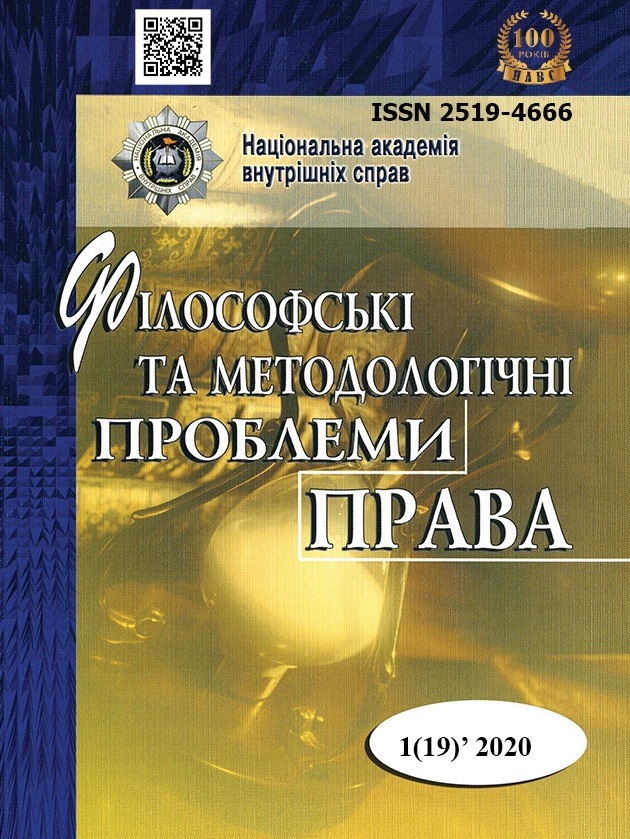Logical Means of Investigative Activity Optimization
Abstract
The purpose of the article consists in a search of logical means of enhancing the efficiency of analysis of investigative versions, evidential materials and testimonies, and also in systematic elaborating the technology of application such means in investigators’ practical activity. Methodology. The method of comparative analysis is used for the exposure of sources of basic contradictions, traced in the most widespread methodological approaches to decision of the examined problem in modern literature. The methods of logical modeling, generalization and formalization are used during the elaboration of logical heuristic strategies and algorithms of investigative optimization. Scientific novelty. Basing upon the methodological tools of the modern logic, there’s constructed an algorithm of investigative activity optimization, which allows systematizing heuristic and searching procedures in this field. Besides, there’s proposed some recommendations, concerned with the technology of effective using the mentioned algorithm in investigative practice. Conclusions. There’s proved that, being used in association with knowledge and experience in forensic and detective operational spheres, methods of logical analysis open wide opportunities in enhancing the efficiency of investigative activity. Particularly, the technique, grounded upon logical heuristic strategies of investigation and algorithms of version «filtration» on proved data base, is an effective mean of systematized narrowing of searching diapason during the planning and conducting the investigative procedures. Moreover, such technique can serve as a ground for elaborating the analytic strategies for the evaluation of certainty and sufficiency of material evidences and testimonies.
Keywords: investigative methodology; efficiency of investigative procedures; optimization of investigative activity; investigative logic; logical analysis of versions; logical criteria of provability; technology of logical arrangement of investigation.
Downloads
References
Булулуков О. Оптимізація тактичних рішень: суб’єктивна та об’єктивна обумовленість. Проблеми законності. 2016. Вип. 133. С. 166–177. doi: https://doi.org/10.21564/2414-990х.133.70650.
Чорноус Ю. Методологічні засади криміналістичного забезпечення розслідування злочинів. Філософські та методологічні проблеми права. 2017. № 1 (13). С. 63–75. URL: https://philosophy.naiau.kiev.ua/index.php/ philosophy/article/view/351.
Dagan H. The New Legal Realism and The Realist View of Law. Law & Social Inquiry. 2018. Vol. 43. Issue 02. P. 528–553. doi: https://doi.org/10.1111/lsi.12319.
Enoch D., Fisher T., Spectre L. Statistical evidence, sensitivity and the legal value of knowledge. Philosophy and Public Affairs. 2012. Vol. 40. No. 3. Р. 197–224.
Fahsing I. The Making of an Expert Detective: Thinking and Deciding in Criminal Investigations. Univ. of Gothenburg, 2016. 108 p.
Girod R. Logical Investigative Methods: Critical Thinking and Reasoning for Successful Investigations. N.Y. : CRC Press, 2015. 270 p.
Колодіна А. Евристичний підхід до побудови методики розслідування: актуальні питання. Науковий вісник публічного та приватного права. 2019. Вип. 3. Т. 2. С. 142–149. doi: https://doi.org/10.32844/2618-1258.2019.3-2.22.
Кравчук О. Формалізація інформаційного механізму державного управління у сфері охорони громадського порядку (на прикладі розслідування злочинів). Вісник Державного університету «Житомирська політехніка». 2019. № 1 (87). С. 185–189. doi: https://doi.org/10.26642/jen-2019-1(87)-185-189.
McCann M. Preface to The New Legal Realism. Cambridge University Press, 2016. Vol. I, II. doi: https://doi.org/10.1017/CBO9781139683432.001.
Pardo M. S. The paradoxes of legal proof: A critical guide. Boston University Law Review. 2019. Vol. 99:233. P. 233–290.
Шаптала Н. Внутрішнє переконання під час оцінки доказів у конституційному судовому процесі. Науковий вісник Національної академії внутрішніх справ. 2019. № 1 (110). С. 22–28. doi: https://doi.org/10.33270/01191101.22.
Шевчук В. Проблеми вдосконалення науково-технічного забезпечення слідчої діяльності. Питання боротьби зі злочинністю. 2017. Вип. 33. С. 108–122.
Шульгін С. Достатність доказів як підстава прийняття процесуальних рішень слідчим та прокурором. Право та державне управління. 2019. № 2 (35). Т. 2. С. 109–116. doi: https://doi.org/10.32840/pdu.2-2.16.
Smith M. When does evidence suffice for conviction? Mind. 2018. Vol. 127. Issue 508. P. 1193–1218.
Тягло А. О стандартах доказательства. Форум права. 2018. № 1. С. 88–94. doi: http://doi.org/10.5281/zenodo.1239007.
Зінченко В. Достатність доказів у ході закінчення досудового розслідування. Юридичний науковий електронний журнал. 2019. № 4. С. 237–240. doi: https://doi.org/10.32782/2524-0374/2019-4/63.
Abstract views: 368 PDF Downloads: 276
Copyright (c) 2020 Philosophical and Methodological Problems of Law

This work is licensed under a Creative Commons Attribution-NonCommercial-NoDerivatives 4.0 International License.
- Authors reserve the right to authorship of their own work and transfer to the magazine the right of the first publication of this work under the terms of the Creative Commons Attribution License, which allows other persons to freely distribute published work with mandatory reference to authors of the original work and the first publication of an article in this magazine.
- Authors have the right to enter into separate additional agreements on non-exclusive dissemination of the work in the form in which it was published in the journal (for example, to post an article in the institution's repository or to publish as part of a monograph), provided that the link to the first publication of the work in this journal is maintained.
- The journal's policy allows and encourages the posting of articles by authors on the Internet (for example, in electronic storehouses of institutions or on personal websites), both before the submission of this manuscript to the editorial office and during its editorial processing, as this contributes to the creation of a productive scientific discussion and positively affects the efficiency and dynamics of citing the published work.




